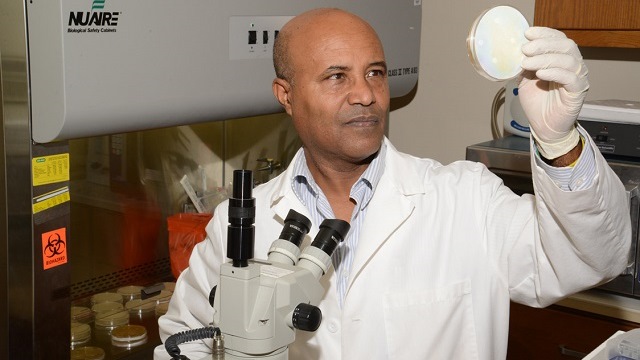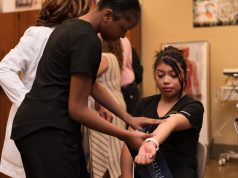
By Dawn Azok
Made in Alabama

Researchers at Tuskegee University’s College of Veterinary Medicine have been awarded a patent for a faster and more efficient way to detect live bacteria that could contaminate the nation’s food supply.
U.S. Patent No. 9434976 was issued for the rapid and more reliable detection of viable foodborne, biothreat pathogens and other infectious microbes using modified Polymerase Chain Reaction (PCR) sample preparation.
In 2014 the same researcher group from Tuskegee University attained a patent for a time-saving method of determining multiple foodborne and biothreat pathogens in food items such as meat, milk and vegetables.
“As with our previous patent, we are again advancing research in microbe detection,” said Dr. Teshome Yehualaeshet, principal investigator for the project. “This time what is so unique about the discovery is not only do we save time but we also improve the accuracy of a technique by enabling the detection of viable or living organisms.”
The discoveries of the Tuskegee team are an example of the groundbreaking research being carried out at Alabama’s universities. An estimated $2.4 billion in federal research and development funds are spent each year in Alabama.
Improved reaction
Drs. Temesgen Samuel, Woubit S. Abdela, and Tsegaye Habtemariam served as co-investigators on the Tuskegee research project. Along with Yehualaeshet, they are faculty members in the College of Veterinary Medicine’s Department of Pathobiology.
“PCR has been developed decades back, and the time spent for conventional PCR and our PCR — we call it viability PCR — protocol is the same,” Yehualaeshet said. “The novel aspect of our patent is that we developed a modified sample preparation, which enables the PCR to detect only viable, or live, bacteria.”
That’s important, he said, because the risk of contamination and disease comes from live bacteria.
“If a detection method could not differentiate the dead from the live bacteria, then there is always a risk of false positive alarm,” he said.
Food protection
The Tuskegee team’s research was funded by the National Center for Food Protection and Defense, which was renamed the Food Protection and Defense Institute (FPDI).
FPDI is one of the Homeland Security Centers of Excellence at the University of Minnesota–Twin Cities. It supports a multidisciplinary, action-oriented research consortium to safeguard the food system comprehensively from farm to table.
Tuskegee is one of the historically black universities that receives FPDI funding.
The research team acknowledges Dr. Frank F. Busta, founding director and director emeritus for the FPDI, for his support of its work, as well the faculty and staff at Tuskegee.
Broad applications
The potential applications of the patent are broad, particularly in the food industry, Yehualaeshet said.
Furthermore, the ability to distinguish between dead and live bacteria helps in other areas, Yehualaeshet added.
“Just to give you one simple example: Various foods have been pasteurized to kill bacteria to make them safe for the consumer. Therefore, the bacteria present in food matrix may be dead due to the treatment, but the DNA, which remains in the sample, turns the regular PCR result positive,” he said.
“Using our modified viability PCR, the presence of only viable bacteria will give positive PCR signal.”
Future work
Dr. Ruby Perry, dean of the Tuskegee University College of Veterinary Medicine, praised the researchers’ work.
“Drs. Yehualaeshet, Samuel, Abdela and Habtemariam are to be commended for their scientific contributions to advance innovations in research that have led to this outstanding discovery. Once again, our researchers are continuously demonstrating that Tuskegee University has a record of accomplishments that make an impact on the world,” she said.
The research team is already working on its next project.
“The current focus is commercialization of the patent and detection kit development, which can be adapted to the users,” Yehualaeshet said. “Currently, we are working on optimization of the protocol for other bacteria and fungus species. The major emphasis will be given to foodborne and biothreat pathogens detection.”
This story originally appeared on the Alabama Department of Commerce’s Made in Alabama website.




